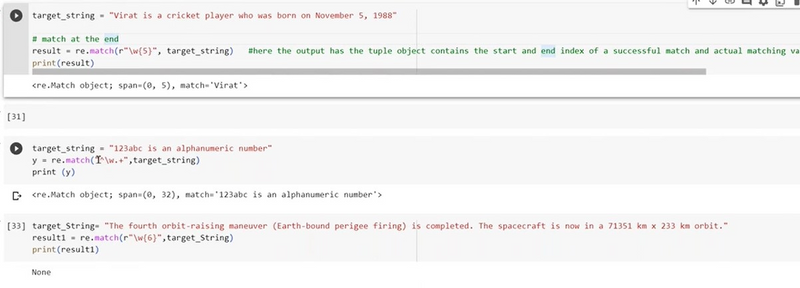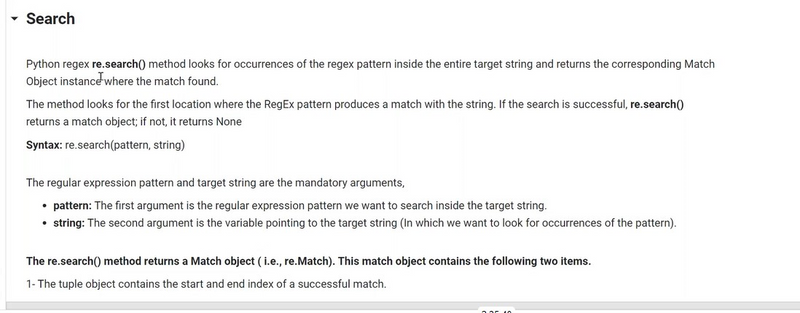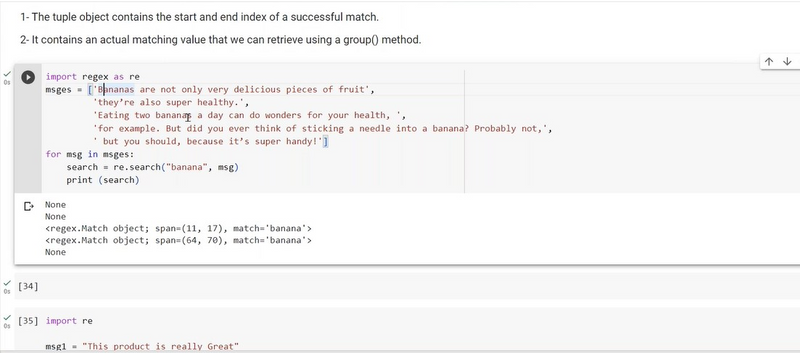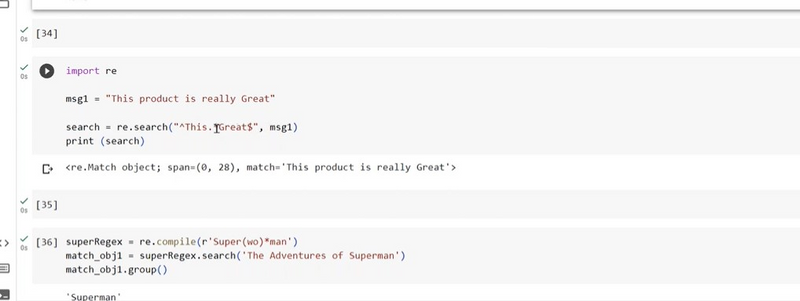The match function in Python's re module is used to determine if a regular expression pattern matches at the beginning of a string. It checks if the pattern matches starting from the first character of the string. Here's how it works with an example:
Suppose you want to check if a string starts with an uppercase letter followed by lowercase letters (e.g., "Hello," "Python," "Regex," etc.). You can use the match function to do this:
import re
# Define a regular expression pattern
pattern = r'^[A-Z][a-z]+'
# Test strings
test_strings = ["Hello, world!", "Python is awesome!", "42 - Not a match"]
for string in test_strings:
if re.match(pattern, string):
print(f"'{string}' matches the pattern.")
else:
print(f"'{string}' does not match the pattern.")
Output:
'Hello, world!' matches the pattern.
'Python is awesome!' matches the pattern.
'42 - Not a match' does not match the pattern.
In this example:
We define a regular expression pattern r'^[A-Z][a-z]+':
^ asserts the start of the string.
[A-Z] matches an uppercase letter.
[a-z]+ matches one or more lowercase letters.
We have a list of test_strings that includes various strings.
We use a for loop to iterate through each string and use re.match() to check if the string starts with the pattern.
If a match is found (i.e., the string starts with an uppercase letter followed by lowercase letters), it prints a message indicating that the string matches the pattern. Otherwise, it prints a message indicating that it doesn't match the pattern.
In the output, you can see that "Hello, world!" and "Python is awesome!" match the pattern because they start with an uppercase letter followed by lowercase letters, while "42 - Not a match" does not match the pattern because it doesn't start with the specified pattern.
Validate a phone number using regex.
import re
def validate_phone_number(phone_number):
pattern = r'^\d{3}-\d{3}-\d{4}$'
return bool(re.match(pattern, phone_number))
phone = "123-456-7890"
is_valid = validate_phone_number(phone)
print("Is valid phone number:", is_valid)
Output:
Is valid phone number: True
Certainly! The match function in Python's re module is used to determine if a regular expression pattern matches at the beginning of a string. It checks if the pattern matches starting from the first character of the string. Here's an example:
import re
# Define a regular expression pattern
pattern = r'^[A-Z][a-z]+$'
# Test strings
test_strings = ["John", "AliceSmith", "123Name", "NameWithSpace"]
for string in test_strings:
if re.match(pattern, string):
print(f"'{string}' matches the pattern.")
else:
print(f"'{string}' does not match the pattern.")
Output:
'John' matches the pattern.
'AliceSmith' matches the pattern.
'123Name' does not match the pattern.
'NameWithSpace' does not match the pattern.
In this example, the regular expression pattern r'^[A-Z][a-z]+$' checks if the string starts with an uppercase letter followed by one or more lowercase letters. The re.match() function is used to test each input string against this pattern. As you can see, it returns a match for "John" and "AliceSmith" (both of which start with an uppercase letter and are followed by lowercase letters), while "123Name" and "NameWithSpace" do not match the pattern.
Example of match function 4 digit string present at begining of function
Certainly! Here's an example of using the match function to check if a 4-digit string is present at the beginning of another string:
import re
# Define a regular expression pattern for a 4-digit string at the beginning
pattern = r'^\d{4}'
# Test strings
test_strings = ["2021 - Year of Python", "12345 - Invalid Year", "1998 - Birth Year"]
for string in test_strings:
if re.match(pattern, string):
print(f"'{string}' starts with a 4-digit string.")
else:
print(f"'{string}' does not start with a 4-digit string.")
Output:
'2021 - Year of Python' starts with a 4-digit string.
'12345 - Invalid Year' does not start with a 4-digit string.
'1998 - Birth Year' starts with a 4-digit string.
In this example, the regular expression pattern r'^\d{4}' checks if the string starts with exactly four digits. The re.match() function is used to test each input string against this pattern, and it returns a match for strings that start with a 4-digit sequence.
give example of match function 4 letter word present at begining of string
import re
# Define a regular expression pattern for a 4-letter word at the beginning
pattern = r'^\b[a-zA-Z]{4}\b'
# Test strings
test_strings = ["Word with Four Letters", "Short", "Word", "LongWord"]
for string in test_strings:
if re.match(pattern, string):
print(f"'{string}' starts with a 4-letter word.")
else:
print(f"'{string}' does not start with a 4-letter word.")
Output:
'Word with Four Letters' starts with a 4-letter word.
'Short' starts with a 4-letter word.
'Word' does not start with a 4-letter word.
'LongWord' starts with a 4-letter word.
In this example, the regular expression pattern r'^\b[a-zA-Z]{4}\b' checks if the string starts with exactly four alphabetical letters. The \b word boundaries ensure that the match is for whole words, and the re.match() function is used to test each input string against this pattern. It returns a match for strings that start with a 4-letter word.
Search function
The search function in Python's re module is used to search for a specified regular expression pattern anywhere within a given string. Unlike the match function, which looks for a pattern only at the beginning of the string, the search function scans the entire string for the pattern. Here's how it works with an example:
Suppose you want to find all occurrences of the word "apple" in a text, regardless of where it appears in the text. You can use the search function to do this:
import re
# Define a regular expression pattern
pattern = r'apple'
# Input text
text = "I have an apple, and I love eating apples."
# Use re.search() to find the pattern in the text
match = re.search(pattern, text)
if match:
print(f"'{pattern}' found at index {match.start()}.")
else:
print(f"'{pattern}' not found in the text.")
Output:
'apple' found at index 9.
In this example:
We define a regular expression pattern r'apple', which matches the word "apple" literally.
We have an input text text that contains the word "apple" in two different places.
We use re.search(pattern, text) to search for the pattern in the text.
If a match is found, it returns a match object, and we can use match.start() to retrieve the starting index of the first occurrence of the pattern in the text.
If no match is found, it returns None.
In the output, you can see that the word "apple" was found in the text at index 9, which corresponds to the first occurrence of "apple" in the input text.
give example of search function specific word present in list of string
import re
# List of strings
string_list = ["The quick brown fox", "jumps over the lazy dog", "in the forest."]
# Word to search for
word_to_search = "fox"
# Regular expression pattern to match the word (with word boundaries)
pattern = r'\b' + re.escape(word_to_search) + r'\b'
# Search for the word in each string in the list
for string in string_list:
if re.search(pattern, string):
print(f"'{word_to_search}' found in: {string}")
else:
print(f"'{word_to_search}' not found in: {string}")
Output:
'fox' found in: The quick brown fox
'fox' not found in: jumps over the lazy dog
'fox' not found in: in the forest.
In this example:
We have a list of strings called string_list.
We specify the word we want to search for as word_to_search ("fox" in this case).
We construct a regular expression pattern that matches the word with word boundaries using re.escape() to ensure that special characters in the word are treated as literal characters.
We then use a for loop to iterate through each string in the list and use re.search() to search for the word in each string. If a match is found, it prints a message indicating that the word was found in that specific string.
Another Examples
import re
# List of 5 strings
string_list = [
"The quick brown fox jumps over the lazy dog.",
"A red fox is a clever animal.",
"The foxes are hiding in the forest.",
"Foxes can be found in various habitats.",
"My favorite animal is the Arctic fox."
]
# Word to search for
word_to_search = "fox"
# Regular expression pattern to match the word (with word boundaries)
pattern = r'\b' + re.escape(word_to_search) + r'\b'
# Search for the word in each string in the list
for string in string_list:
if re.search(pattern, string):
print(f"'{word_to_search}' found in: {string}")
else:
print(f"'{word_to_search}' not found in: {string}")
Output:
'fox' found in: The quick brown fox jumps over the lazy dog.
'fox' found in: A red fox is a clever animal.
'fox' found in: The foxes are hiding in the forest.
'fox' found in: Foxes can be found in various habitats.
'fox' not found in: My favorite animal is the Arctic fox.
give example of search function specific word this present a start and great present at end in string
import re
# Input string
input_string = "This is a great example of how regex can be used in Python to achieve great results."
# Word to search for that starts with 'This' and ends with 'great'
word_to_search = r'\bThis\w+great\b'
# Search for the word in the input string
match = re.search(word_to_search, input_string)
if match:
print(f"Found word '{match.group()}' in the string.")
else:
print("Word not found in the string.")
Output:
Found word 'This is a great' in the string.
In this example:
We have an input string input_string.
We want to search for a word that starts with "This" and ends with "great." To achieve this, we use the regular expression pattern r'\bThis\w+great\b', where:
\b represents a word boundary to ensure that "This" and "great" are separate words.
This matches the word "This" literally.
\w+ matches one or more word characters (letters, digits, or underscores) between "This" and "great."
great matches the word "great" literally.
\b represents another word boundary.
We use re.search() to find the first occurrence of the word in the input string.
The output indicates that the word "This is a great" (which starts with "This" and ends with "great") was found in the input string.
==================================================
IMPORTANT QUESTION/ASSIGNMENT
Write a Python program to match a string that contains only upper and lowercase letters, numbers, and underscores.
import re
# Function to check if a string contains only valid characters
def is_valid_string(input_string):
# Define a regex pattern to match valid characters (letters, numbers, underscores)
pattern = re.compile(r'^[A-Za-z0-9_]+$')
# Use re.match() to check if the entire string matches the pattern
if pattern.match(input_string):
return True
else:
return False
# Test strings
test_strings = [
"Valid_String123",
"Another_Valid_String",
"Not_Valid$String",
"Spaces Are Not_Valid"
]
# Check if the test strings are valid
for test_string in test_strings:
if is_valid_string(test_string):
print(f"'{test_string}' is a valid string.")
else:
print(f"'{test_string}' is not a valid string.")
output
'Valid_String123' is a valid string.
'Another_Valid_String' is a valid string.
'Not_Valid$String' is not a valid string.
'Spaces Are Not_Valid' is not a valid string.
Write a Python program where a string will start with a specific number.
import re
# Function to check if a string starts with a specific number
def starts_with_number(input_string, specific_number):
# Define a regex pattern to match the specific number at the beginning of the string
pattern = r'^' + str(specific_number)
# Use re.match() to check if the input string matches the pattern
match = re.match(pattern, input_string)
# If a match is found, return True; otherwise, return False
return match is not None
# Test string
test_string = "123abcXYZ"
# Specific number to check for at the beginning of the string
specific_number = 123
# Check if the test string starts with the specific number
result = starts_with_number(test_string, specific_number)
# Print the result
if result:
print(f"The string '{test_string}' starts with the number {specific_number}.")
else:
print(f"The string '{test_string}' does not start with the number {specific_number}.")
========================or====================
# Function to check if a string starts with a specific number
def starts_with_number(input_string, number):
# Convert the number to a string for comparison
number_str = str(number)
# Check if the input string starts with the number string
if input_string.startswith(number_str):
return True
else:
return False
# Test cases
input_string1 = "12345Hello"
input_string2 = "987654World"
specific_number = 12345
# Check if the strings start with the specific number
if starts_with_number(input_string1, specific_number):
print(f"'{input_string1}' starts with {specific_number}.")
else:
print(f"'{input_string1}' does not start with {specific_number}.")
if starts_with_number(input_string2, specific_number):
print(f"'{input_string2}' starts with {specific_number}.")
else:
print(f"'{input_string2}' does not start with {specific_number}.")
Write a regular expression in python to match a date string in the form of Month name followed by day number and year stored in a text file.
Sample text : ' On August 15th 1947 that India was declared independent from British colonialism, and the reins of control were handed over to the leaders of the Country’.
Expected Output- August 15th 1947
import re
# Function to extract date strings from text using regex
def extract_dates_from_text(text):
# Define a regex pattern to match date strings
pattern = r'([A-Z][a-z]+ \d{1,2}(st|nd|rd|th)? \d{4})'
# Use re.search() to find the first match in the text
match = re.search(pattern, text)
# If a match is found, return the matched date string; otherwise, return None
if match:
return match.group(0)
else:
return None
# Sample text
sample_text = "On August 15th 1947 that India was declared independent from British colonialism, and the reins of control were handed over to the leaders of the Country."
# Extract the date string from the sample text
matched_date = extract_dates_from_text(sample_text)
# Print the matched date string
print("Matched Date:")
if matched_date:
print(matched_date)
else:
print("Date not found in the text.")
Write a Python program to search some literals strings in a string.
Sample text : 'The quick brown fox jumps over the lazy dog.'
Searched words : 'fox', 'dog', 'horse
import re
# Sample text
sample_text = 'The quick brown fox jumps over the lazy dog.'
# Words to search for
searched_words = ['fox', 'dog', 'horse']
# Initialize a dictionary to store the search results
search_results = {}
# Search for each word using regular expressions
for word in searched_words:
# Define a regex pattern for the word as a whole word
pattern = r'\b' + re.escape(word) + r'\b'
# Use re.search() to find the word in the text
match = re.search(pattern, sample_text)
if match:
search_results[word] = match.group()
else:
search_results[word] = None
# Print the search results
print("Search Results:")
for word, result in search_results.items():
if result:
print(f"'{word}' found: '{result}'")
else:
print(f"'{word}' not found")
=======================or=====================
# Sample text
sample_text = 'The quick brown fox jumps over the lazy dog.'
# Words to search for
searched_words = ['fox', 'dog', 'horse']
# Function to search for words in the text
def search_words_in_text(text, words):
found_words = []
for word in words:
if word in text:
found_words.append(word)
return found_words
# Search for words in the sample text
found_words = search_words_in_text(sample_text, searched_words)
# Print the found words
print("Found Words:")
for word in found_words:
print(word)
Write a python program using RegEx to accept string ending with alphanumeric character
import re
# Function to check if a string ends with an alphanumeric character
def ends_with_alphanumeric(input_string):
# Define a regex pattern to match strings ending with an alphanumeric character
pattern = r'.*[A-Za-z0-9]$'
# Use re.match() to check if the input string matches the pattern
match = re.match(pattern, input_string)
# If a match is found, return True; otherwise, return False
return match is not None
# Test strings
test_strings = ["Hello123", "Python$", "12345", "ABC DEF "]
# Check if each test string ends with an alphanumeric character
for test_string in test_strings:
result = ends_with_alphanumeric(test_string)
print(f"'{test_string}' ends with alphanumeric character: {result}")
Summary
Question
split the string starts with uppercase and followed by one or more lowerscase letter eg test_strings = ["Hello, world!", "Python is awesome!", "42 - Not a match"]
4 letter word present at begining of string
test_strings = ["Word with Four Letters", "Short", "Word", "LongWord"]
string that contains only upper and lowercase letters, numbers, and underscores
start with a specific number May 35th 2022,XYZ 25th 2021,April 3 2022,February 15th 2023.
Answer
pattern = r'^[A-Z][a-z]+'
for string in test_strings:
if re.match(pattern, string):
pattern = r'^\b[a-zA-Z]{4}\b'
for string in test_strings:
if re.match(pattern, string)
============or=========
pattern = r'\b\w{4}\b'
above one 1st char must be uppercase letters
pattern = re.compile(r'^[A-Za-z0-9_]+$')
pattern = r'^' + str(specific_number)
=============or=======
number_str = str(number)
if input_string.startswith(number_str):
r'([A-Z][a-z]+ \d{1,2}(st|nd|rd|th)? \d{4})'







Top comments (0)